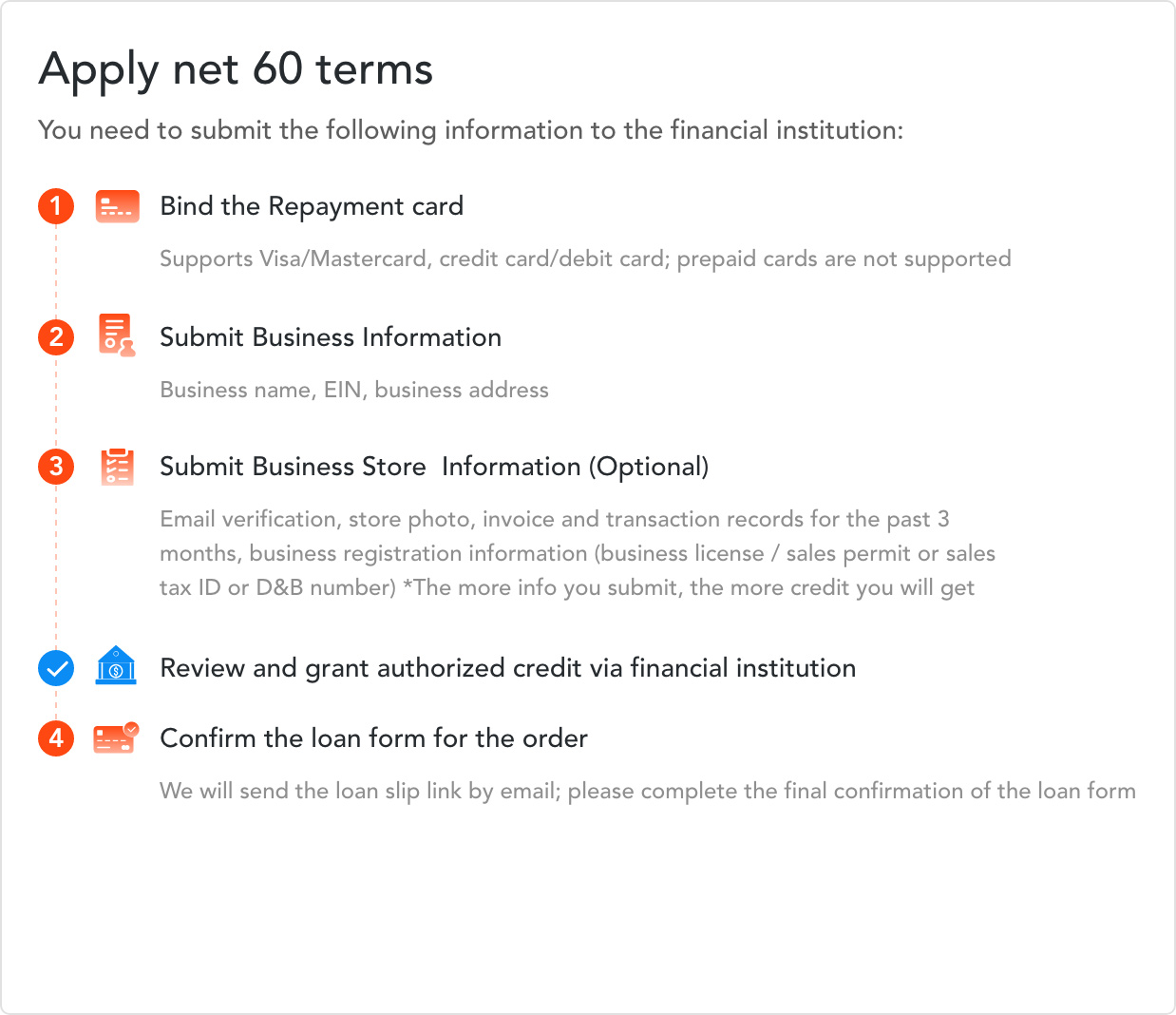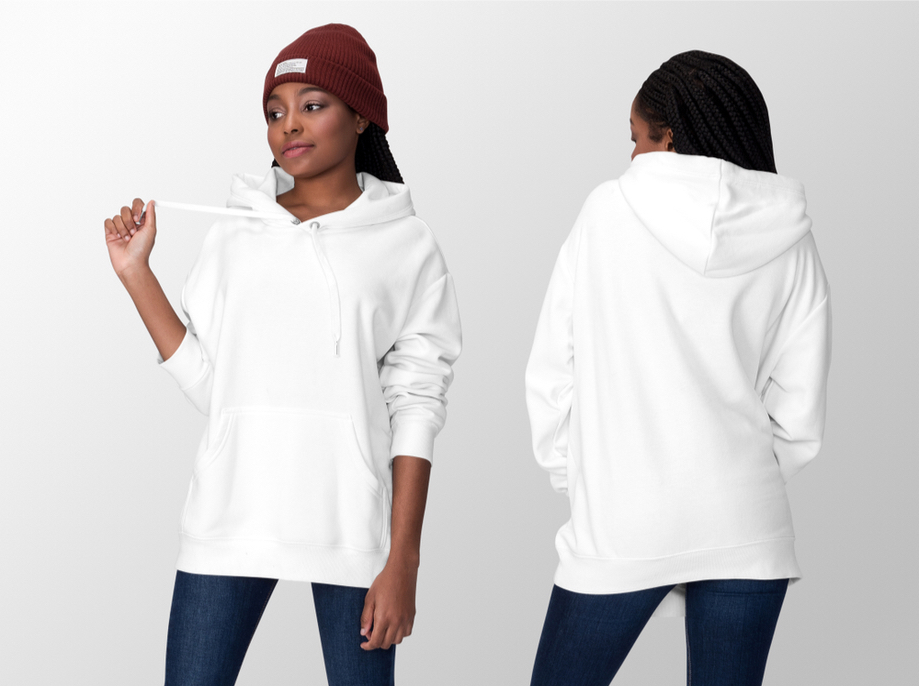
Have you wondered about ways to begin your own ecommerce business, or expand your current offerings for more revenue? Many people are surprised to know that they don’t actually need to invest in product development in order to have their own successful product line. In today’s digital landscape, a private label business model offers simple solutions.
With private labeling, businesses can work with third-party manufacturers to develop their own custom branded products. Private labeling is a great option for individuals or brands that already have an audience established, and want to generate passive income through selling products online. can be created for any business: from the local yoga studio who wants to sell their own line of mats, to the national grocery chain who wants to offer their own branded line in stores.
What does private labeling mean, and how does it work?
Private label products, also sometimes called white label products, are items created by one company to be branded and sold by another organization. A business leader that is selling private label products is doing so in order to put their own spin (including their business name) on a product and sell it as their own. Private label can sometimes be confused with wholesale models, but in wholesale, there is no branding element happening - products are sold by the retailer just as they come from the manufacturer. With private label, the goal is to tweak the product in order to be sold as a proprietary good by the retailer. Items like clothing, cosmetics, and condiments in grocery stores tend to be the most popular options for private label sales.
Total retail sales for private label products is projected to hit almost $6 billion by 2024 - so, business is booming and it’s a smart time to learn more about private label revenue streams. Think about your favorite big box store to better understand private labels: Walmart has their own “Great Value” brand, Costco has the “Kirkland” brand, etc.
Private label essentially allows entrepreneurs to start businesses without recreating the wheel. Here’s what you need to know if you’re considering a private label venture.
Image source: Statista

The benefits of private labeling
Private labeling is attractive to many business owners because they can simplify their product development basis. That’s a big advantage, and just the tip of the iceberg. Other benefits include:
- Production control - You will collaborate with third-party manufacturers, but ultimately you’ll choose the materials, ingredients, production rates, and more.
- Optimized production costs - Since you’re ultimately selling, the price is up to you. Work with manufacturers that align with your pricing strategy and allow you the most substantial profit margins.
- Flexibility - Moving quickly to meet customer needs is a huge advantage in the retail world. Private labeling allows sellers to seek out niche products and have them produced faster than larger enterprises.
- Your own marketing and branding - You’ll have full control over what your packaging looks like, how products are priced, and a promotional plan for your brand.
- Added revenue streams - Private labeling creates new revenue streams for organizations of every type. Many businesses who operate in an unrelated industry are able to strengthen their brand awareness and customer loyalty by offering private label products (merchandise branded with their name/logo). As in our example above, a yoga studio could not only increase their credibility, but also make additional revenue by selling private label mats, water bottles, and clothing in their storefront or on their website.
Challenges of private labeling
As with most business ventures, to launch a private label correctly, you’ll have some work in front of you. While there are many benefits to private labeling, you can expect some hurdles as well.
- Reliance on manufacturers - Since you don’t actually make the products in-house, you’re doing to be dependant on those who do. This is why it’s important to select a high-quality manufacturer that can provide assurances.
- Limited brand awareness - It takes more time to create a brand from scratch. If you are launching a private label brand as a totally new business, expect to spend some time promoting your business. You can get a head start in this area by choosing products that you know meet a need or demand in your market.
- Questions on quality - When private label businesses first began, they had a reputation of being lower quality. However, in today’s landscape, that is changing rapidly. Carefully choosing suppliers and then adhering to strict quality control processes can offer assurance.

Private label manufacturers that can help you develop a custom branded product line
It’s important to understand that even if private label manufacturers appear the same on the surface, they aren’t - and those differentiators can make a big difference in how you sell products. Consider your business needs both now and in the future, along with product specifications, where and how you want to ship, and your eventual sales price. Vet manufactures carefully or work with an advisor or marketplace that can help you narrow down your choices to high-quality, reliable sources.
Here are some of the best private label manufacturing or product sourcing apps for a variety of product lines. In some cases, Shopify users can take advantage of the Shopify app to connect directly to their online store.
How to Create, Design and Manufacture a Product from Scratch
AOP+ is based out of London and offers a large selection of print on demand products for Shopify or Etsy stores. They are known for their direct-to-garment items like hoodies and t-shirts, but customers say they particularly love the range of sublimated “all-over-print” items like the face masks. The AOP+ app integrates with Shopify stores to automate order processing and fulfillment. Users say the platform is intuitive, with the ability to create products in as little as 30 seconds. It’s also worth noting that AOP+ does the printing itself, rather than using a third-party supplier. Their specialty is apparel and accessories, so this company is a favorite among online boutiques. Finally, AOP+ prides itself on their live customer support team, which customers generally find informative and helpful.

This company is designed for entrepreneurs who want to scale their drop-shipping business. Shipping from the US, EU, and China, this supplier helps sellers with automated order processing, local shipping (when available), and a responsive client support team. Merchants who use the private label manufacturer’s platform say that the ability to sync with Shopify is very helpful. Reviews also mention that it’s easy to use. One note: all payments are in USD, no matter where your company or your customers live.
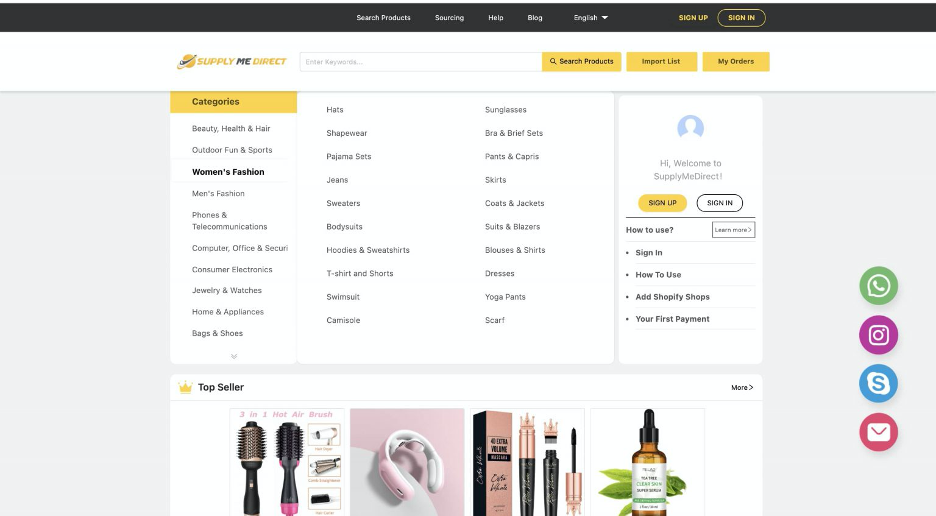
This app is one of the largest, quality USA dropshipping suppliers around. As an official partner of the AliExpress Booster Program for dropshipping, Modalyst can connect Shopify stores directly to AliExpress suppliers and products. Because of that, sellers find that they have access to an extensive catalog of products (over a million items available for dropshipping). In terms of private label specialties, they are known for atheleticwear. Modalyst also automates order processing and fulfillment, and their Pro plan costs $90/month and has a 5% transaction fee. Their shipping times are particularly noteworthy: typically three to eight days for US orders and less than 15 business days for international shipping.

This business is based out of Los Angeles and is a favorite among Shopify apparel retailers. A print-on-demand company, Apliiq is a private label supplier that focuses on trendy products (for example, pocket tees, liner hoodies, and jackets.) One unique thing about this supplier is that they brand all apparel with custom tags (so there are no manufacturer tags - only your branding). Similar to SupplyMeDirect or AOP+, they automate order processing and fulfillment. Their promise is to ship any order within a week, and the app also provides tracking information directly to the customer. Retailers love that their customers can see when their order will arrive in real-time.

Alibaba
The company known as Alibaba Group is arguably the largest ecommerce company in the world. In 2020, their revenue hit more than $72 Billion. They offer one of the most robust directories of products and excel in connecting retailers with manufacturers everywhere.
Alibaba is a little different than some of the suppliers we already mentioned, because they don’t have a Shopify app and it’s not possible to integrate the two platforms. That being said, Alibaba offers so many private label products that we would be remiss not to mention them. Spend some time browsing the directory to find almost any product you could want.
Working with Alibaba is a little different than some of the ideas we mentioned above. With Shopify apps, a lot of the process will be automated. With this company, brands need to purchase a large quantity of private label products directly from the manufacturer. This is a good thing for inventory costs and and profit margins, but it does require a significant investment up front. While you go through the process, manufacturers can work with you to develop custom designs and logos if needed.
Alibaba and it’s partner site, AliExpress, can be complex. To help you navigate these offerings, browse these resources:
5 questions you should ask before manufacturing overseas
What are some tips from experienced people on the simplest way to import products to the USA
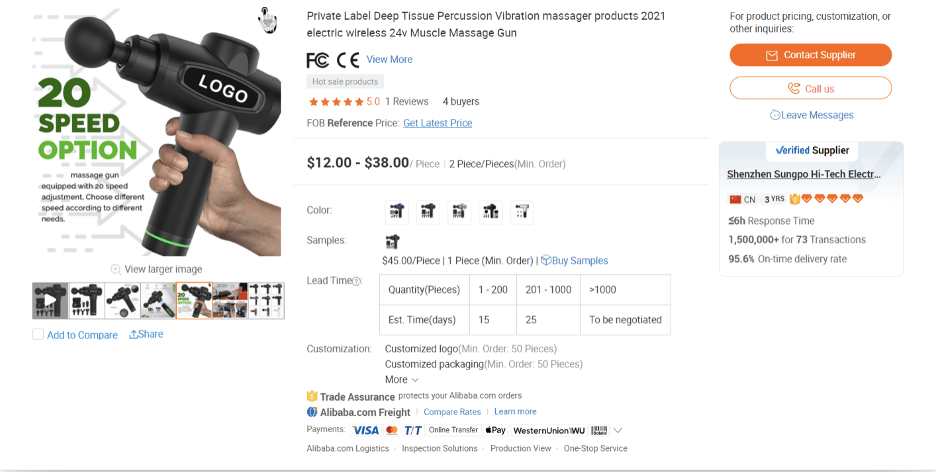
Dripshipper
Dripshipper is a great app that specializes in private label coffee. Sellers can create and customize their own branded packaging, including logos, pricing, and labeling. Dripshipper is based in the US, ships worldwide, and ensures that all shipments go out within five days of when orders are placed (so customers always get the freshest product). According to the app, whole beans will ship out the very same day they’re roasted, while ground beans go out the following day. The pricing plans are tier-based, beginning at $30 per month and going up to $197 per month for an Elite plan (that also provides access to their in-house design team).
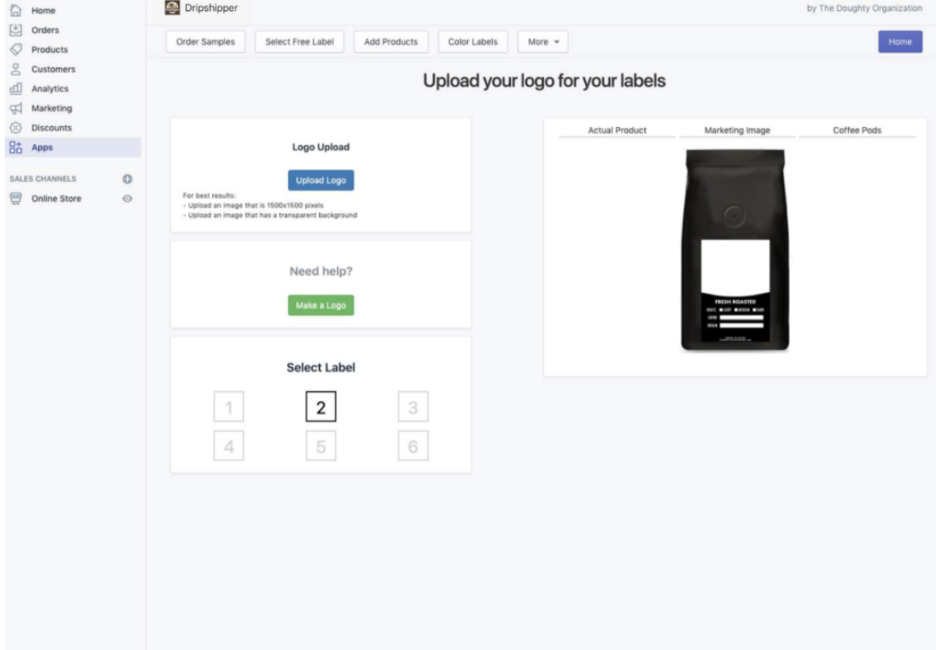
A one-stop-shop for wholesale private label products, Newlabel provides optimized manufacturing, delivery and customer services to brands in the United States. Merchants can sign up for free and work with engineers and international trade experts who help US brands to grow. Newlabel offers a user-friendly platform to match private label businesses with the top 1% of wholesale factories that can bring their business to life. Customers can take advantage of net 60 terms with no fees, the ability to receive samples before bulk orders, and free shipping on all bulk orders. Easily shop trending private label products like bracelet sets, jar candles, and even unicorn fidgets.

A private label business: basic best practices
Just because you don’t have to worry about in-house product development (or inventory in some cases), doesn’t mean you’re off the hook. There are certain steps that private label sellers should follow to make sure their business has the best chance at success.
1. Find products that appeal to a niche category
The truth is that you can private label products for almost every industry. The options are endless when it comes to private label. But that doesn’t mean every private label product will perform well. Carefully consider different niche markets within the categories that you do business in. Sometimes people are fearful of selling to a narrow audience. The truth is that reaching a specific market allows you to use highly targeted promotional strategies, which will be more effective than promoting to a broader audience in the long run. Currently, the most popular private label products are things like:
- Hair products
- Body care products
- Pet products
- Baby products
- Beard grooming products
- Health and wellness products
Learn more: How to Start Private Label Cosmetics?
- Reach out to manufacturers
After you’ve made the tough decision about what to sell, you have to start looking at who supplies such items. Seek out manufacturers and/or suppliers who offer those private label products. Take note of private label or dropshipping websites that specialize in particular categories (for example, the Dripshippers supplier we mentioned). Create a short list of companies and contact them to see if they offer private labeling. If they do, talk to them about setting up an account. Many manufacturers offer a robust line of products, and the best way to narrow down what you want is to explore the selection of products within the niche you’re interested in. Talk to the supplier about things like minimum order values, shipping times and locations, etc. These conversations will help you to understand if you need to do things like hold stock or set up a prepay account with the manufacturer.
Learn more: 5 questions you should ask before manufacturing overseas
3. Get samples
Of course you want to touch and feel the product yourself before you sell it to others. In some cases, things look great in photos but appear completely different in person. Even If you’ve had promising conversations with the manufacturers, you need to test products for yourself before offering them at a wider scale. Part of your due diligence in this process is obtaining samples of anything you want to sell, in order to ensure quality. It’s a good idea to have a process or document in place that addresses standards and expectations, and then make sure products meet those standards. Furthermore, as your business grows, consider the future and how you will ensure all products meet those quality standards.
4. Create your online store
So, you’ve found a manufacturer you are excited about and products that you know will sell - now what? The next step is to set up an online store on a shopping platform. The largest ecommerce platform is Shopify, but there are other quality options to choose from as well (such as Magento Commerce or 3DCart). Depending on which platform you choose, you can customize your web experience with things like ecommerce templates, or browse the app store to find private label business that sync with your website.
5. Populate your store with products
The technical aspects of adding products to your store will vary. Depending on which platform you’re using, you can find some helpful instruction in this video: How To Create An eCommerce Website With Wordpress No matter which platform you use or how you add products, you’ll want to keep the following in mind for the best experience:
- Create compelling product descriptions - These descriptions should be brief, but offer plenty of benefits-oriented information. Make sure to list the features and specifications that people expect to see, but go beyond that information and entice people. Use this space to show people what’s great about your product.
- Include high-quality product images - Shoppers are not likely to buy an item without a thorough understanding of what the product looks like. As you choose which images to include, remember that these graphics are the closest the consumer can get to the product without seeing it in person. In some cases, the manufacturer can supply images to you. No matter where you get your images, make sure they are the best quality, clear, and show the product from multiple angles.
- A carefully considered pricing strategy - The fact is that pricing does play a key role in what people will buy, especially when it comes to shopping online where there is so much variety. Your prices need to be high enough to make a meaningful profit but not so high that you’re pricing your products out of the market.
6. “Flip the switch”
If only it was that easy! There is a lot more than wil go into launching your private label brand than just turning on your ecommerce store.
When you’re ready to reveal and sell your private label products to your audience, you have to build awareness, drive traffic, and promote your offerings. If you don’t do these things, you shouldn’t expect many sales. In many cases, new stores can get a jump on traffic by advertising through paid channels like Google, Facebook, and Instagram. Complement these efforts with tactics like email promotions, social media outreach, content marketing, SEO strategies, and customer loyalty programs. Create a comprehensive marketing plan that includes the exact steps you’ll take to promote your brand. In some cases, it makes sense to begin this work before your ecommerce site even launches (for example, a post to generate excitement on social media).
Make money from your own private label offering
Private labeling allows entrepreneurs with a vision to sell high-demand products with a unique spin. You can skip the hassle of product development but you still need to spend time choosing great suppliers, differentiating products, and setting up your online store. Whether you are an individual with a great idea, or part of an established business looking to expand revenue streams, private label products offer a world of possibility.
Private Labeling FAQ
What does private labeling cost?
You should expect to spend between $1,000 and 5,000 to begin a private label business. If someone promises success for less than $1,000 initially, be wary. The highest expenses come in the form of ordering samples and setting up the logistics/administration for your own business. Things like setting up a website, payment processing, and order fulfillment all have an expense. Look for manufacturers than can help you to streamline this process.
How should I price private label products?
There are a variety of factors that will go into pricing your products. The important thing is to make sure your pricing is based on accurate information (and not just a guess, or the number that appears most profitable). Consider the manufacturing costs, shipping fees, and the expenses that go into offering your products (such as website fees and online advertising). Taking all of that information into account, come up with a number. Then, compare that number to that of your competitors. How do you stack up? You don’t want to be too far off in either direction. You can also test pricing strategy by seeing what customers will pay while providing a profit. It’s ok for pricing to fluctuate as you figure out a strategy.
How do I create my own private label brand?
The more comprehensive answer is covered above. Follow the information provided in this article to start your own private label products. The simple answer is to follow these steps: 1. Find a specific market with niche products. 2. Select and contact the manufacturer. 3. Order samples. 4. Set up on online store. 5. Upload products to your store. 6. Launch and promote your store.
Can people make money private labeling?
Of course! You can make money private labeling. Follow the steps we’ve outlined above to create a strong private label business.


